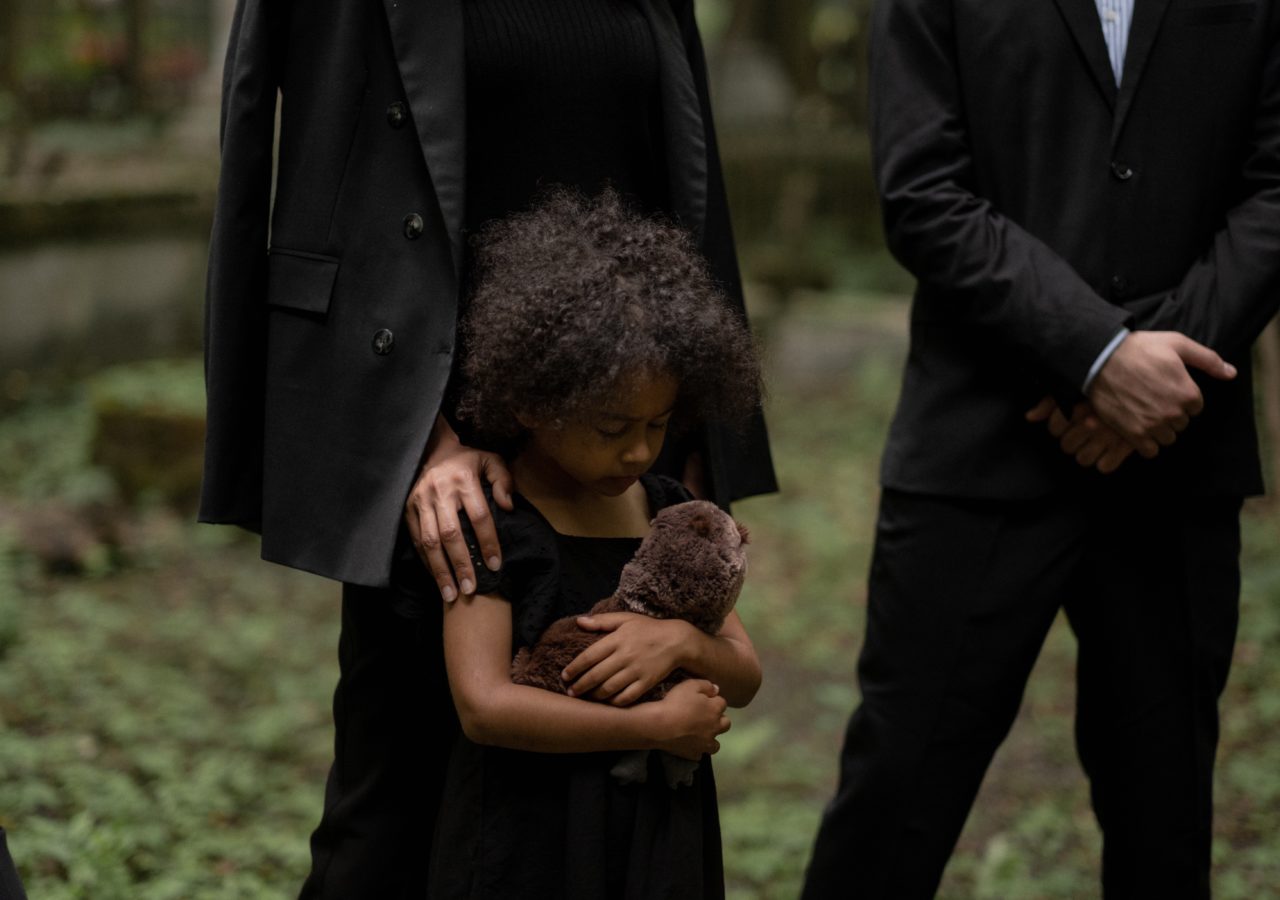Death can be a fearsome and loaded word. But talking about it with our children can help them make sense of it and express their worries and tears turning it into a force for good
Imam Hussain’s Legacy; Helping Children Deal with Grief and Loss

Earlier this summer, my mother in law passed away after a long illness. Despite her advanced age, the family was truly shaken by this loss. Having already lost their grandfather three years’ prior, the children especially found this very difficult to cope with. Suddenly there were lots of big feelings and uncertainty. No more grandparents’ house where the wider family would meet, no more phone calls from Bibi on your birthday. Her death left a big hole in everyone’s heart.
As I looked around me, I wondered what everyone’s tears were communicating. Was it a sadness that we had lost a very prominent personality in the family, someone who had been there forever? Was it regret at not having spent enough time with her, especially in her weak and dying days? Was it a fear that the safety net of their parents has disappeared, leaving mum and dad exposed to death themselves? Was it that they didn’t understand death and were not sure where their grandmother had gone? Or was it all of those things intermingled, creating confusion and bewilderment.
It struck me then that, although we as adults had grown up with the tragedy of Imam Hussain (as) and the harrowing stories of what our beloved Prophet and his household endured, we don’t necessarily have a healthy relationship with death ourselves.
We often fear it, don’t understand it and strangely don’t expect it even though the ancient proverb tells us that the only certainty in life IS death.
Having spent a lot of time recently in Iraq through different circumstances, I found the idea of death and especially martyrdom was never far away. Statues and memorials are difficult to miss at junctions and government buildings in most cities. The swaying green flags of the Hussaini movement planted as far as the eye can see. And slogans convey the reverence of those who died for noble causes and immortalised though the Quranic ayah: ‘And do not say that those martyred in the cause of Allah are dead – in fact, they are alive but you perceive it not’ (2:154).
In fact, to many Iraqis, nay most Iraqi families with adult children today, across the world, untimely death touched them at some point. Young men who went to battle and never came back, sometimes their news vanishing as quickly as they did, leaving inconsolable anguish in the hearts of mothers and family. Mothers and children killed by a blast in the local mall or shrine. It could happen anytime. It could happen to anybody.
But our children have not grown up with this. They are puzzled by death, heedless of it and can be fearful of it. It doesn’t happen all that frequently, it seldom happens unexpectedly and therefore it may not warrant much attention.
But our religion encourages us to remember death. ‘Die before you die’, Imam Ali (as) said, denoting that remembering death wakes us up from a heedlessness slumber. Death is what gives life meaning. It injects in us an urgency to make things happen and to evaluate how we live and what we stand for on a regular basis. As Martin Luther King Jr. powerfully expressed: ‘If a man hasn’t discovered what he will die for, he isn’t fit to live.’
Muharram and Safar are a great opportunity for us to remember a man who certainly knew what to die for. Imam Hussain (as). But not just Imam Hussain, his family and companions who stared death in the eye with conviction and strength, who knew they would die for the cause and were given the option to abandon the ark of salvation but stayed firm. These are the examples we are so blessed to have. Not only because they are an annual if not daily reminder to stay firm and unshakeable. But they are an exalted source of inspiration to our children. For they come from every generation to touch every generation, no matter the age and stage we are at. We encounter them each year with new understanding, new perspective and more life experience.
So how can we practically help re-frame death to our children, extract the fear and replace it with faith and reassurance?
1. Death is not the end
This is a powerful message often neglected by many Muslims and non-Muslims. In a secular society where many believe there is no life after death, the whole paradigm shifts. A person may feel they have to ‘make the most’ of their life, experience it to the full and enjoy every moment. Responsibilities and duties to others may fall by the wayside in the quest for happiness and fulfilment- before it is too late. We need to make sure we present a different narrative to our children. One that proposes the tenet that humans are eternal beings and life on earth is but a stage much like our lives in the womb of our mothers where we could not comprehend the next step but were moving towards it. The stages taking us ever closer to our true essence. The emphasis then becomes on living our best life, fulfilling our duties and potential in preparation for the onward journey, one that is not alarming but compelling and motivating.
2. Normalise death
It is uncommon for the word ‘death’ to come up in a serious conversation among friends, at school or even among the family. It is usually avoided and associated with negativity and labelled ‘depressing.’ But we as parents can lessen the potency of this by making it a part of our everyday life – because it is. Talking about those who have died keeps their memory alive providing comfort but also reminds our children that death is certain. Allah (swt) says in the Holy Quran: ‘Every being shall taste death’ (29:57).
Visiting the cemetery is highly recommended on certain days of the year like Eid and shouldn’t be something perceived as creepy and eerie. Make it a regular event and take snacks to give out to other visitors. Children can even take something to occupy them quietly to alleviate boredom if they are too little to participate in recitation and prayers. Paying Sadaqa on behalf of loved ones and praying for them is also highly recommended. This provides an opportunity to connect us with the memory of those who have passed, as well as bring the concept of death to the forefront to allow children to ask questions and express their natural curiosity.
3. Marking death anniversaries
Our beloved Prophet Muhammed (saw) and our Imams are our guides and role models in our effort to attain Allah’s pleasure. Learning about how they lived and how they died strengthens our connection to them emotionally and spiritually, allowing us to be inspired by them, derive strength from their examples and ascend in our relationship with Allah (swt). Celebrating their birth anniversaries is both fun for our children and a pause to think about them and learn from them. Commemorating their death anniversaries also allows us to connect to them and their awe inspiring character. As we approach the death anniversary of the Prophet on 28th of Safar, this marks a junction to discuss his life, death and legacy with our children stimulating them to aim high and aspire to be better every day.
4. Let your child cry
It is uncomfortable and unsettling to see our children cry. And it can be very upsetting for them to see mama and baba cry too. Interestingly it may reduce the potency of seeing a crying parent if we just explain to our children why we are shedding tears. Whether it is for Imam Hussain or suffering the loss of a loved one, it is often reassuring for children to feel included or informed rather than being distanced in an effort to protect them from seeing you cry. It also models that crying is natural and accepted.
The Quran gives us examples of grieving prophets of Allah (swt) who were devout and strong but expressed their grief through tears. Prophet Jacob (as) cried for his son Joseph (as) until he lost his sight. We should not be ashamed of it or feel it signifies weak faith or objection to Allah’s will. It is a healthy expression of sadness.
In the same way, our children should be allowed to express their grief at losing a family member, friend or even their pet. We can offer comfort, an attentive, non-judgmental listening ear and allow them to slowly find calm through their tears and our support, without aiming to halt the tears.
5. Speak about inspiring martyrs of Karbala
Whether it is the young Sakina or the teenage Qasim, or Ali Akbar for young adults, these examples are a perpetual reminder that dying in the cause of Allah is honourable. And as we hold on to the rope of Allah (swt) and await our 12th Imam, steadfast in our faith and working hard, we too are aspiring to live an honourable life. The words of our martyrs become beacons of guidance and a force that galvanises action and change. Qasim (as) was asked by his uncle at his tender age: ‘How do you see death?’ His astonishing reply came as ‘With you, uncle, death is sweeter than honey’. This both teaches us as adults not to shield our children from these difficult conversations and also more importantly that children are wiser and more mature when we prepare them and instil the love of Allah (swt) and the truth in their very being.
Their memory also encourages us and our children to have foresight and patience, to know that everything that comes from Allah is ultimately good, even if we don’t see that in the moment. This is both reassuring and soothing in the times of hardship and difficulty that we will all undoubtedly encounter through our lives.
Death can be a fearsome and loaded word. But talking about it with our children and helping them make sense of it, express their worries and tears as well as re-framing it can be a source of comfort both for us and for them, turning it into a force for good and positive change.


